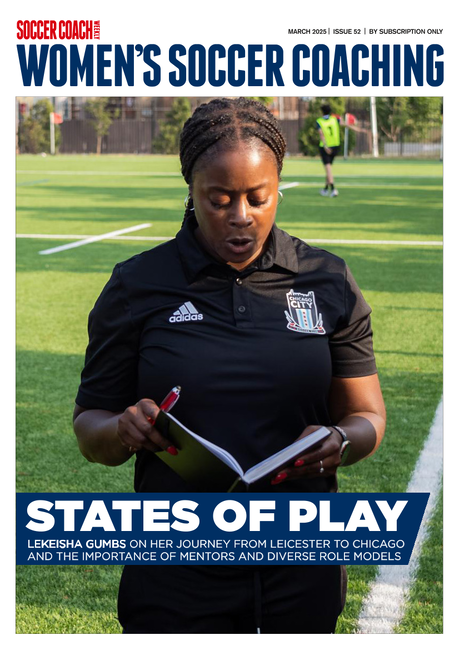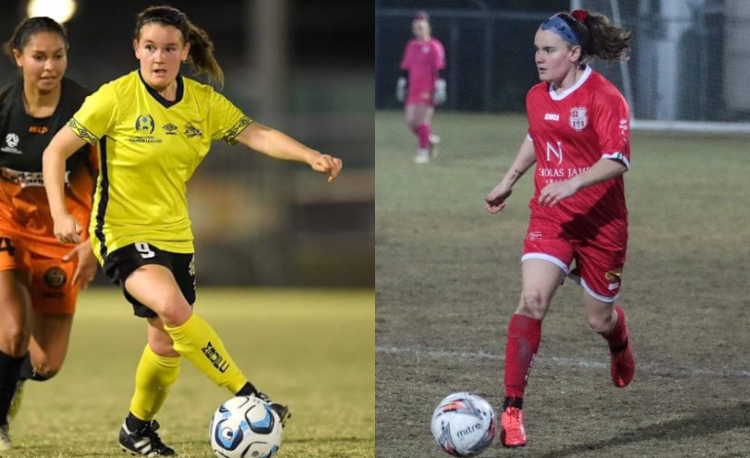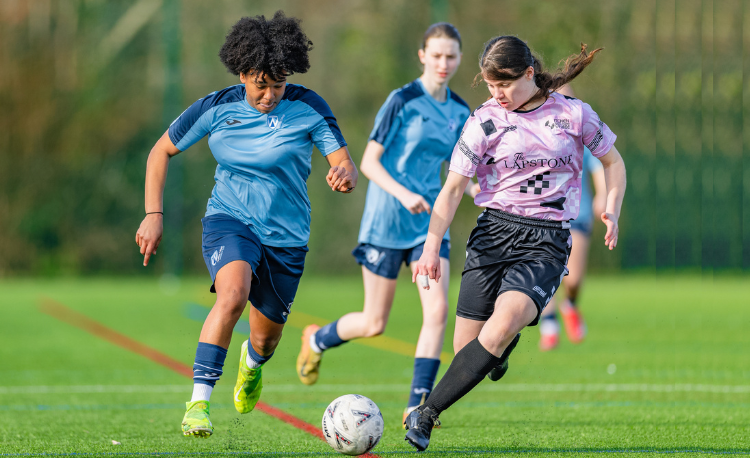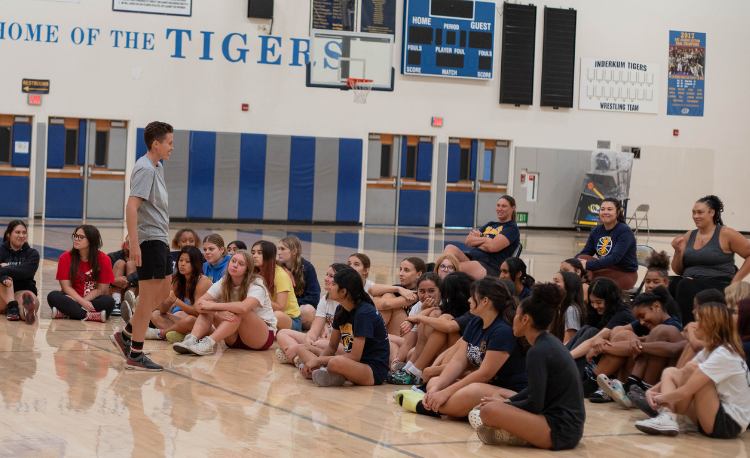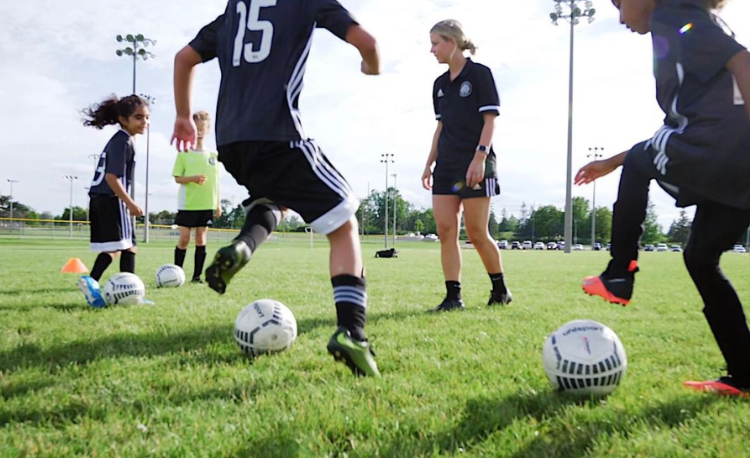You are viewing
1 of your 3 free articles
Samantha Griffiths: Learning on the job
Leadership may have come naturally to Derby County Women head coach Samantha Griffiths, who has been in charge for six years. But, as she tells Carrie Dunn, some parts of management took some getting used to.
When Samantha Griffiths began coaching as a teenager, she always hoped it would lead to a career in soccer.
Her leadership potential at that young age was obvious – she could be seen at the local sports facility, timing other children’s races and measuring their jumps.
Playing soccer was her first love. She joined Derby County Women in 2009 and became an integral, influential player who donned the captain’s armband.
Coaching ambitions still burned. Her day job within the Football Association – then as a mentor – helped her complete her coaching badges and gave her a broad perspective on the game, on and off the field.
Then, seven years ago, came a terminal blow to her playing career. She suffered an anterior cruciate ligament (ACL) injury that led to her retirement and, ultimately, her move into management with Derby in 2018.
Griffiths acknowledges that moving from playing into management – going from team-mate to decision-maker – is a culture shock, regardless of how many coaching qualifications you have.
“There’s nothing that prepares you for making that substitution at the right time, or managing emotions: people getting upset with not being picked and not being part of squads,” she says.
“That’s the bit I found really challenging, to be honest, when I first started to become a manager, with all this power to bring people off, put people on, pick teams, pick squads.
“The bit I found really challenging was all this power to bring people off and pick teams...”
“I was quite comfortable with the coaching. I’d been doing it since I was 14 or 15 – the Xs and Os weren’t the problem. It was more the managing side of the game that took me a good two or three seasons to get my head around.”
One of the biggest changes off the field has been the integration of the women’s team within Derby County FC as an entity, and the adoption of a real ‘one club’ ethos.
The men’s team were twice champions of England in the 1970s and were last in the Premier League in 2008, but are now in the second tier, having earned promotion from tier three last season.
Griffiths’ team compete in the third tier of the women’s game, the FA Women’s National League North, and is pleased to be fully supported by the club’s hierarchy.
“When I first took over, we weren’t officially under the men’s umbrella,” Griffiths explained. “We carried the name, but we were our own kind of entity.
“Then we started training at the men’s training ground, so things were slowly starting to develop.
“This [2023-24] has been our first season fully embedded, under the management umbrella and part of the main club.”
That season was marked with a successful campaign in the FA Women’s National League Plate, beating Cambridge United 3-0 in the final, to earn the first piece of silverware of Griffiths’ coaching career.

The Plate is the secondary cup competition for National League teams, entered by those who lose in the first round of the League Cup.
“In an ideal world, it’s not the one that you want to go into,” admits Griffiths. “You want to stay, play and compete in the League Cup as long as possible.
“As soon as we lost and we ended up going to the Plate, it was absolutely imperative that we went and won that.”
Of course, in tier three, the eyes of every head coach are on reaching the second-tier FA Women’s Championship, but Griffiths says there is no pressure on her or Derby County to get promotion.
At present, they are getting to grips with a hybrid model of operation – offering optional daytime training sessions for those able to attend, but also accommodating those players with stable full-time jobs who are only able to train in the evening.
“I think tier three is probably the most challenging league there is,” Griffiths said, of the National League. “Unless you’re privileged enough to be in a full-time [managerial] position with full-time players, every other manager and player is trying to juggle a full-time [day] job.
“Gone are the days where it just used to be a Tuesday and Thursday [training session] for a couple of hours. I can pretty much guarantee most teams in tier three are at least operating off three nights a week, most probably four nights a week.
“We have a bit of a split within the team, of players that have good full-time jobs, and then we have the really hungry kids, who just want more and more [training]. Trying to balance two sets of players that have very different needs is quite a challenge.
“It’s about setting out expectations at the start. The ones that are coming [to the daytime sessions] see it as a benefit that they get an extra session, without putting the older players under pressure.
“A lot of our players are teachers or work in the NHS [health service]. They’re not jobs where I would ever be saying, ‘You need to cut that hour of work,’ because, at the end of the day, they’re never going to be professional footballers. They play football because they love it.”
Griffiths is one of those who has a full-time job away from Derby, as the FA’s coach development manager for women and girls in the East Midlands region.
She recruits and supports new female coaches, from absolute beginners to professionals, and identifies talent in perhaps less orthodox ways.
She mentions, particularly, “those mums that stand on the sideline, week in, week out, every Tuesday, every Saturday or Sunday” as women she wants to encourage into more formal coaching roles.
“It’s not easy,” Griffiths admits. “It’s a cultural thing we try hard to break down. Typically, mums we engage with say, ‘I’ve never played. I don’t know enough to coach.’
‘I THINK IT IS IMPORTANT THAT PLAYERS SEE STAFF ARE VULNERABLE’
Related Files
One of Griffiths’ guiding principles is that coaches need to acknowledge what they would like to improve in their own practice.
She said: “I’m certainly one that will say, ‘I’m not great at this. I need to get better at it and this is my strategy for doing that.
“I think it’s important that players see staff are vulnerable, and that we can hold our hands up when we get stuff wrong, or not approach things in the right way.”
There is also subtlety in the language around how Griffiths approaches improving her players, with emphasis on the role of the coach, not the individual concerned.
“Our main focus is on the players’ strengths and ‘super-strengths’,” she said.
“We do a lot about what you bring to the team, and then identifying areas for improvement – [it’s about] what you need help to get better at, as opposed to ‘You’re not very good at this, what are you going to do about it?’.
“It’s my job to improve their weaknesses. If I don’t, I’ve not done my job to the best of my ability.
“That’s a challenge for me every year. I’ve always told the players: ‘It’s my job to help you get better’.
“That’s the way we sell it, and the way we talk about it: areas for improvement, as opposed to weaknesses.”
‘THE EMPATHETIC SIDE OF THE GAME IS HUGE – AND IT’S NOT JUST A FEMALE THING’: SAMANTHA ON HOW TO HAVE DIFFICULT CHATS
Samantha says she would love to see more coaches empowered and confident in broaching tricky or uncomfortable conversations.
Her previous job as an FA mentor taught her a lot about the skills required for that, and she emphasises that knowing your players as individuals is key.
“Build relationships with your players and understand how to approach the conversations, because they’re all very different,” she said.
“Some will be just black and white – ‘Just tell me, I’ll be fine’. Others need a bit more of a softly-softly approach.
“We work a lot on it at Derby. It’s not just about on the pitch. A lot of it is off the pitch, in how we create an environment where players are comfortable to come and have conversations with us.
“It might not be with me. Someone might have a better relationship with a different coaching staff member that they can go to.
“The empathetic side of the game is huge, and that’s across the boys’ and the girls’ game. I don’t think it’s just a female thing.
“I think the boys need it just as much, and that’s why I am so passionate at the FA around trying to get more females into coaching.
“Sometimes kids just need an arm [around them] or someone to talk to.”
“But the little ones, especially, don’t need too much around tactical strategies. They just need to go and have fun.
“We need players at that age just to fall in love with the game. And if you look at a lot of the skillsets that the mums have, in terms of the empathetic side, they know how to create a safe environment, they’re approachable – that’s a skillset we try and lean on to convince them.
“Research is now telling us that younger females around the adolescent phase are dropping out [of soccer] because they’re not feeling comfortable with things that are changing in their bodies and to go into that [with the] male coach stood on the side.
“There’s a real drive around trying to get more female coaches at that age group, to make those players feel more comfortable and that they’ve got somebody to go to and understand what they’re feeling.”
And, from this coming season, Griffiths has another responsibility – working with the England under-16s.
She will be assisting the head coach, as part of the FA’s drive to give talented coaches experience within the international set-up.
It’s a new challenge and a fantastic learning opportunity, something Griffiths is always keen to snap up.
What’s more, having been involved in the game in England for so long, she’s thrilled to see the chances that are now available for new coaches to progress.
“It’s about supporting and helping people. Not footballers – people. People come first...”
“The opportunities are out there, especially around coaching and the funding that you get now. It’s there for people who’ve got heart, desire and determination,” Griffiths said.
And, of course, there’s a support network available via Griffiths and her colleagues at the Football Association, for any women of any age who want to take the plunge, regardless of their own soccer playing experience.
For her own part, Griffiths’ coaching journey is something like the one she would have dreamed of as the teenage girl who led the sporting activities at the local leisure centre.
“I’m pretty happy with where I’m at,” she reflects. “I get a little bit of a mix of everything – what the FA teaches me helps me with Derby, and what Derby teaches me helps me with the FA. It all comes under the same banner.
“To me, [coaching is] about helping people. It’s as simple as that – whether it’s helping people to achieve something or helping people to get better at something.
“It’s all about supporting and helping people. Not footballers – people. People always come first.”
Newsletter Sign Up
Newsletter Sign Up
Discover the simple way to become a more effective, more successful soccer coach
In a recent survey 89% of subscribers said Women's Soccer Coaching makes them more confident, 91% said Women's Soccer Coaching makes them a more effective coach and 93% said Women's Soccer Coaching makes them more inspired.
*includes 3 coaching manuals
Get Inspired
All the latest techniques and approaches
Women's Soccer Coaching offers proven and easy to use soccer drills, coaching sessions, practice plans, small-sided games, warm-ups, training tips and advice.
We've been at the cutting edge of soccer coaching since we launched Soccer Coach Weekly in 2007, creating resources for the grassroots youth coach, following best practice from around the world and insights from the professional game.





